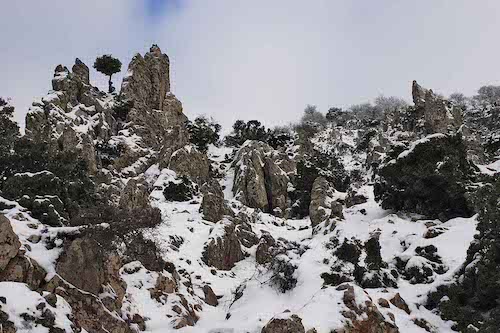Finally winter has arrived on the island. Boreas, the North wind, merrily roars over the island, lowering temperatures along his way and he also brought his daughter Chione, goddess of the snow. She has deposited a thin layer of ice-cold fuzz over a large part of the island.
I sometimes joke that this cold wind comes from Siberia, making us dig out our woolen shawls, hats and gloves. Maybe I wasn’t that far from the truth because the god of the North wind Boreas is said to live in mountains in the north. Their always snowy tops protect a country from the moods of Borea; it’s where warmth and happiness rule, where mythical people, resembling giants live, and where age can rise up to a thousand years: this is Hyperborea. One of the many stories around this paradise is that it was Hyperboreans who founded the Apollo temples and its oracles on Delphi and Delos.
Hellanicus of Mytilini (Lesvos) was a logograph, a fancy word for an historian from ancient times. It is up to logographers to make a distinction between myths and real facts. In a time without internet that must have been a Herculanean task. Hellanicus was born in 490 BC in Mytilini and died some 85 years later, opposite of Lesvos on the (nowadays) mainland of Turkey. He was famous during his life, but later scientists were not so keen about what he wrote, even though he wrote many books (the history of Attica and the Peloponnesian war, the history of Troy and Persia or about the priestess of Hera in Argon). Think about it: he, like so many other scientists from ancient time, believed that Hyperborea lay behind the Riphean mountains, these mountains also being mythological and whose location remains unknown. Most of the stories about this mountain range come from the Greeks.
Maybe the Riphean mountains were a prototype for the Big Wall in Game of Thrones: a wall of ice and snow far in the North that separated our world from an empire that was lived in by the Walking Dead. Except that Greeks, and even some Romans, believed that those mountains full of snow were hiding a warm country of milk and honey. Maybe those were the Alps, the Urals or the Carpatians. It is a fact that in the 16th century the name of the Riphean mountains slowly disappeared from the world maps, while in the Middle Ages, Hyperborea had became an expression for ‘an area at the end of our world’.
Not everybody thought that Hyperborea was behind the Riphean mountains. Some scientists said this mythical country was in England. I can well imagine that the cold wind comes from England, but I cannot see how England could hide a warm paradise. Celts were no giants and the huge cool stones of Stonehenge do not seem to me as ever having been a centre of a happy empire. Astrologer Ptolemy and geographer Marcian of Heracles placed Hyperborea in the middle of the North and called that the Hyperborean Ocean. But how can such a dark and cold sea be home to a warm country? It reminds me a bit of the lost Atlantis.
Others, like philosopher Pliny, poet Pindar and historian Herodotus, but also the poet Vergil and statesman Cicero thought about the North Pole, because they said that the sun only once a year rose and set in Hyperborea, which could mean it must have been above the arctic circle. Siberia might not be in the Arctic, but certainly is close by, so saying that Boreas comes from Siberia might be not that far from the truth.
As far as I know Hellanicus never has published something serious about his island Lesvos. He was born a little century after Sappho, who described Lesvos more or less as a paradise. Also the Romans considered Lesvos as an ultimate holiday destination because of its beauty. When Boreas with his cold winds does not bully the island, Lesvos very well may resemble Hyperborea. No scientists ever suggested this idea, so I am pretty disappointed in the ancient Greeks, especially Hellanicus.











